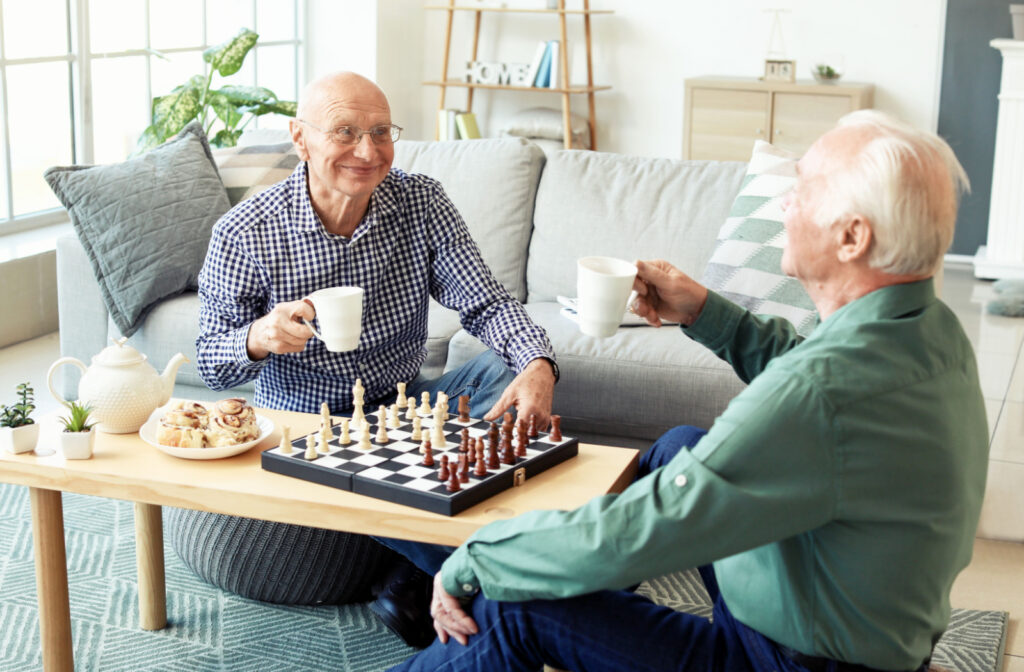As a caregiver of a loved one with dementia, it can be difficult to come up with activities and ideas that are enjoyable for them. Not only is it important to monitor the well-being of those with this condition, but finding meaningful ways to give them purpose and joy is essential as well.
Activities that can help seniors living with dementia include:
- Board games
- Puzzles
- Listening to music
- Gardening
- Arts and crafts
- Walking & swimming
- Writing letters
- Memory exercises
There are a variety of activities you can use to fill their days with helpful stimulation and connection. These tried-and-true activities have been proven useful for seniors living with dementia.
Playing Board Games
Playing board games is more than just a fun pastime—it’s an excellent activity for people with dementia. Not only does it stimulate the brain, but it also encourages socialization, which is great for cognitive health. Board games provide a low-stress environment for seniors to interact with others, which helps them maintain communication skills and build relationships.
Also, playing games can help with memory retention and problem-solving skills, keeping the mind active and engaged. Just because someone has dementia doesn’t mean they can’t enjoy the simple pleasures of life, and board games are a perfect example of this. By incorporating games into their daily routine, people with dementia can experience a good quality of life and enjoy the company of others while doing so.
Doing Puzzles
For those with dementia, completing a puzzle can be a powerful source of joy and accomplishment. The act of piecing together a puzzle engages the mind, requiring a level of focus and concentration that can be incredibly calming. As pieces come together and the picture slowly emerges, individuals may experience a sense of satisfaction and achievement, a reminder that they are still capable of completing meaningful tasks.
When experiencing stress or anxiety, puzzles can serve as a healthy, distraction-free way to cope. Whether working on their own or with the help of a caregiver, the process of completing a puzzle can be a small but meaningful victory in the journey of living with dementia.
Listening to Music
Music has the power to uplift and energize. For individuals experiencing dementia, this is more than just music to their ears. Listening to music can stimulate memories, emotions, and moods, bringing a newfound level of comfort.
Music has the unique ability to trigger memories as well as emotions associated with specific moments in time. This phenomenon benefits those experiencing dementia and their caregivers, as the melodies evoke positive emotions that can alleviate anxiety and depression.
It’s amazing how a simple tune can brighten someone’s day and significantly reduce stress levels. Music has proven to be an effective therapy, and its ability to bring joy, hope, and memories to people with dementia offers them an avenue of escape from the challenges of their condition.
Gardening
Gardening is a wonderful activity that has numerous benefits, including physical activity. For people with dementia, gardening can be especially helpful in promoting coordination and balance. The act of digging, planting, watering, and weeding all require movement, which is great for physical health.
In addition, gardening provides a sensory experience that can be calming and stimulating at the same time. The smells, textures, colors, and sounds of nature can help stimulate memory and cognitive function, making gardening an enjoyable and therapeutic activity for people with dementia.
It’s a win-win situation. Not only does gardening promote physical health, but it also provides a sense of purpose and accomplishment for people with dementia, enhancing their overall quality of life.
Making Arts & Crafts
Engaging in arts and crafts can offer numerous benefits to people of all ages. The benefits become even more significant for individuals with dementia or Alzheimer’s. A series of studies reveal that art therapy can reduce agitation and enhance cognitive function. Creating something with our own hands can give a sense of accomplishment and pride, which can boost self-esteem.
Crafting helps to sharpen cognitive skills, especially memory, focus, and motor and sensory skills. For individuals with dementia, this can positively impact their quality of life, allowing them to maintain their independence and feel encouraged. In addition, the social nature of arts and crafts can serve as an opportunity for friends and family to bond with their loved ones in the healing, therapeutic environment created by art.
Taking Walks or Going for a Swim
It’s no secret that exercise is an essential component of a healthy lifestyle, and taking walks or going for a swim can do wonders for your mental and physical well-being. These low-impact activities may not seem like much, but they can be incredibly effective at reducing stress, increasing energy levels, and improving overall fitness.
Whether your loved one prefers the tranquility of a peaceful walk or the invigorating feeling of dipping into a cool pool, incorporating these activities into their routine can have a significant positive impact on their health.
Writing Letters or Stories
The art of writing letters and stories has been proven to be a therapeutic exercise for people with dementia. Not only does it enhance language skills, but it is also a great platform for self-expression. Through letters, they can articulate their thoughts and feelings, and stories allow them to tap into their imagination.
Writing becomes an avenue for individuals to tell their unique stories, making them feel valued and heard. It’s a meaningful way to connect with their loved ones and the world around them. Because dementia can cause communication barriers, writing has the power to break down those walls and bring people closer together.

Participate in Memory Exercises
As people age, it’s not uncommon for memories to fade. For people with dementia, it can become increasingly difficult to recall past events and important moments from their lives. However, there are ways to help preserve memory function. Participating in memory exercises is one method that can help seniors keep their minds active and engaged.
These exercises can range from simple memory games to more complex mental challenges that require problem-solving and critical-thinking skills. Through these activities, seniors can exercise their cognitive abilities and improve their overall memory function.
Prioritize Their Lifestyle
At Round Lake Senior Living, we understand the importance of engaging in meaningful activities. We prioritize your loved one’s desired lifestyle with individualized care plans that focus on their specific needs—including physical fitness programs to mentally stimulating activities that will help them get more out of life each day. Contact us today for a tour and discover how we can help your loved one reach their best potential.



